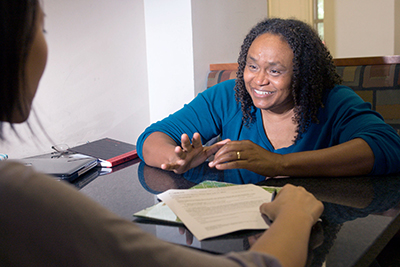Death takes a toll on the living, and in the case of baby boomers, the loss of a family member increases their likelihood of ending up in the hospital, according to new research from the University of Georgia.
Led by Dr. Toni P. Miles, professor of epidemiology in the College of Public Health, the research looked at how survivors responded to spouse, parent, sibling or child loss.
A report of any loss resulted in a 20 to 30 percent increased risk of health care use, she said. The risk for baby boomers six or more years past the loss was even greater. Compared to respondents without spousal or parental death, these grievers had a 75 to 95 percent increased risk of health care use.
“From these findings, we know a family member’s death can impact personal health,” Miles said. “We have to acknowledge that this is an issue. The public health community needs to better help people with bereavement.”
The research was published in the American Journal of Hospice and Palliative Medicine and is part of a larger Mortality Project being conducted by the university. Through the Mortality Project, UGA researchers study how loss affects a survivor’s health. Along with research on loss and health care use, the Mortality Project has helped pastors improve their practices for grieving families with training available from the Association for Clinical Pastoral Education, https://www.acpe.edu.
“Grief is driving more Americans to health care each year,” Miles said. “The Mortality Project focuses on how to care for the grief stricken and how to reduce the risk of health care use. With this work, we are starting a conversation on the survivors of loss.”
Using data from the Health and Retirement Survey, Miles’s current study focuses on a cohort of baby boomers, born between 1946 and 1964, who had likely experienced the death of a family member.
“Baby boomers are at an age where their parents may have ailing health,” Miles said. “The Health and Retirement Survey creates a window into what’s happening during this critical time.”
Some grievers also depended on the family member for health insurance and find themselves without the same coverage after the person dies. In those cases, survivors have a greater chance of hospitalization since they often delay medical treatment.
“These factors and losses accumulate over time,” Miles said. “Over the years, deaths of family members and health habits can increase a person’s risk of hospitalization and doctor visits.”
The research also identified strategies to help survivors. Engaging in physical activity can help lower a person’s risk of hospitalization by as much as 50 percent.
“Walking at an easy pace can help newly grieving persons diminish their risk for illness after loss,” Miles notes.
The study co-authors include Cherie Simpson of the University of Texas and Joseph C. Allegra, Amara Ezeamama, Kerstin Gerst-Emerson and Jennifer Elkins of UGA.
The journal article is available online at https://ajh.sagepub.com/content/early/2014/09/24/1049909114552125.full.pdf+html.
Read the original article at UGA Today. Additional coverage in the ASPPH Friday Letter.
– Molly Berg
Posted November 6, 2014.






